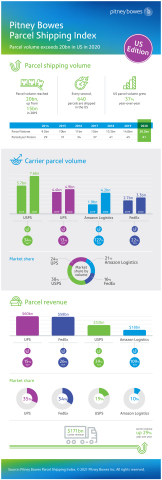New data shows total US volume reached 20 billion parcels in 2020 as Amazon Logistics parcel volume doubles in momentous year for industry
Pitney Bowes Inc. (NYSE:PBI), a global technology company that provides commerce solutions in the areas of ecommerce, shipping, mailing, data and financial services, today released the US data from its latest Pitney Bowes Parcel Shipping Index, ahead of the global Index launch later this month which will include data from 13 countries, including the top 8 GDP nations. Now in its sixth year, the industry report is the strongest indication to date of the pivotal influence the pandemic has had on the US shipping and logistics industry.
This press release features multimedia. View the full release here: https://www.businesswire.com/news/home/20210914005274/en/

Pitney Bowes Parcel Shipping Index - US Edition (Graphic: Business Wire)
The Index reveals US parcel volume grew 37 percent year-over-year, reaching 20 billion, up from 15 billion in 2019. In 2020, around 640 parcels were shipped per second, compared to 466 in 2019. Between 2015 and 2020, US parcel volume doubled from 10 billion to 20 billion.
Looking ahead, Pitney Bowes forecasts US parcel volume will nearly double by 2026, reaching 32-39 billion, with a 10% CAGR from 2021-2025.
Key takeaways from the Index are:
-
Carrier revenue
- Reached $171 billion – a 29 percent increase year-over-year
- UPS generated the highest carrier revenue with $60 billion, FedEx generated $58 billion, USPS reached $33 billion while combined revenue from others was $2 billion.
- USPS generated a 40 percent increase in parcel revenue growth year-over-year, FedEx 26 percent growth and UPS 15 percent growth
-
Carrier market share
- By revenue, UPS had the highest parcel market share (35 percent, down from 39 percent in 2019), followed by FedEx (34 percent, down from 35 percent), USPS (19 percent, up from 18 percent) and Amazon Logistics (10 percent, up from 6 percent)
- By volume, USPS had the highest market share (38 percent, the same as in 2019), followed by UPS (24 percent, down from 30 percent), Amazon Logistics (21 percent, up from 13 percent) and FedEx (16 percent, down from 18 percent)
- USPS shipped 7.6 billion parcels in 2020, up from 5.7 billion in 2019; UPS shipped 4.9 billion parcels in 2020, up from 4.4 billion; and FedEx shipped 3.3 billion, up from 2.7 billion
-
Amazon Logistics
- Grew revenue to $18 billion – a 109 percent increase year-over-year
- Shipped more than twice as many parcels year-over-year, rising 127 percent from 1.9 billion to 4.2 billion
- Passed twice as many parcels to carriers for last mile delivery in 2020 (2.8 billion) compared to 2019 (1.4 billion)
“Every year, the Pitney Bowes Shipping Index offers unrivalled industry insight. For the US, the Index for 2020 reveals record volumes and extraordinary growth to mark a year like no other,” said Jason Dies, EVP and President Sending Technology Solutions, Pitney Bowes. “A 37 percent increase in parcel volume year-over-year compares with an average growth of 10 percent over the past five years. 20 billion parcels represent an average of 61 parcels generated per U.S citizen. Going forward, accelerated investment in infrastructure, technology and digital capabilities will help carriers address surging demand, deliver at scale and cope with the unpredictable.”
The rise in ecommerce had a huge impact on 2020’s monumental parcel shipping volumes. BOXpoll™ by Pitney Bowes, the consumer survey on current events, culture and ecommerce logistics, found 41 percent of consumers continue to shop online more today than they did before the pandemic, underscoring the record growth of ecommerce over the past 17 months.
“The pandemic had an enormous impact on the growth of ecommerce, driving the most significant shift from in-store to online shopping ever experienced,” said Dies. “And as we head into this year’s holiday season, consumer preferences for online shopping show no signs of slowing down.”
Data for the remaining 12 countries in the Index - Canada, Brazil, Germany, UK, France, Italy, Norway, Sweden, China, Japan, Australia and India – will be released shortly and will include a forecast of how shipping is expected to grow in the coming years. The decision to release US data earlier was made to meet high market demand in the US. Based on proprietary and published data, the Index has become a valued industry benchmark since the inaugural report in 2015.
About the Pitney Bowes Parcel Shipping Index
The Pitney Bowes Parcel Shipping Index measures parcel volume and spend for business-to-business, business-to-consumer, consumer-to-business and consumer consigned shipments with weight up to 31.5kg (70 pounds) across Australia, Brazil, Canada, China, France, Germany, India, Italy, Japan, Norway, Sweden, the United Kingdom and the United States. Population data points were sourced from the International Monetary Fund, World Economic Outlook Database published in October 2018. The Pitney Bowes Parcel Shipping Index spans 13 countries and represents the parcel shipping activity of 3.7 billion people.
About Pitney Bowes
Pitney Bowes (NYSE:PBI) is a global technology company providing commerce solutions that power billions of transactions. Clients around the world, including 90 percent of the Fortune 500, rely on the accuracy and precision delivered by Pitney Bowes solutions, analytics, and APIs in the areas of ecommerce fulfillment, shipping and returns; cross-border ecommerce; office mailing and shipping; presort services; and financing. For 100 years Pitney Bowes has been innovating and delivering technologies that remove the complexity of getting commerce transactions precisely right. For additional information visit Pitney Bowes at www.pitneybowes.com.
View source version on businesswire.com: https://www.businesswire.com/news/home/20210914005274/en/
Contacts
John Spadafora
Pitney Bowes
M +1 518 708 3466
John.spadafora@pb.com
Marifer Rodriguez
Pitney Bowes
M +1 203 940 3718
Marifer.rodriguez@pb.com














